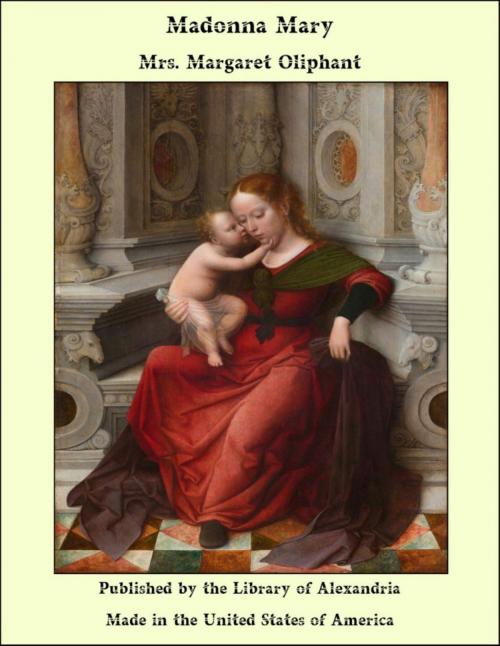| Author: | Margaret Oliphant Wilson Oliphant | ISBN: | 9781465591777 |
| Publisher: | Library of Alexandria | Publication: | March 8, 2015 |
| Imprint: | Language: | English |
| Author: | Margaret Oliphant Wilson Oliphant |
| ISBN: | 9781465591777 |
| Publisher: | Library of Alexandria |
| Publication: | March 8, 2015 |
| Imprint: | |
| Language: | English |
MAJOR OCHTERLONY had been very fidgety after the coming in of the mail. He was very often so, as all his friends were aware, and nobody so much as Mary, his wife, who was herself, on ordinary occasions, of an admirable composure. But the arrival of the mail, which is so welcome an event at an Indian station, and which generally affected the Major very mildly, had produced a singular impression upon him on this special occasion. He was not a man who possessed a large correspondence in his own person; he had reached middle life, and had nobody particular belonging to him, except his wife and his little children, who were as yet too young to have been sent “home;” and consequently there was nobody to receive letters from, except a few married brothers and sisters, who don’t count, as everybody knows. That kind of formally affectionate correspondence is not generally exciting, and even Major Ochterlony supported it with composure. But as for the mail which arrived on the 15th of April, 1838, its effect was different. He went out and in so often, that Mary got very little good of her letters, which were from her young sister and her old aunt, and were naturally overflowing with all kinds of pleasant gossip and domestic information. The present writer has so imperfect an idea of what an Indian bungalow is like, that it would be impossible for her to convey a clear idea to the reader, who probably knows much better about it. But yet it was in an Indian bungalow that Mrs. Ochterlony was seated—in the dim hot atmosphere, out of which the sun was carefully excluded, but in which, nevertheless, the inmates simmered softly with the patience of people who cannot help it, and who are used to their martyrdom. She sat still, and did her best to make out the pleasant babble in the letters, which seemed to take sound to itself as she read, and to break into a sweet confusion of kind voices, and rustling leaves, and running water, such as, she knew, had filled the little rustic drawing-room in which the letters were written. The sister was very young, and the aunt was old, and all the experience of the world possessed by the two together, might have gone into Mary’s thimble, which she kept playing with upon her finger as she read. But though she knew twenty times better than they did, the soft old lady’s gentle counsel, and the audacious girl’s advice and censure, were sweet to Mary, who smiled many a time at their simplicity, and yet took the good of it in a way that was peculiar to her. She read, and she smiled in her reading, and felt the fresh English air blow about her, and the leaves rustling—if it had not been for the Major, who went and came like a ghost, and let everything fall that he touched, and hunted every innocent beetle or lizard that had come in to see how things were going on; for he was one of those men who have a great, almost womanish objection to reptiles and insects, which is a sentiment much misplaced in India. He fidgeted so much, indeed, as to disturb even his wife’s accustomed nerves at last.
MAJOR OCHTERLONY had been very fidgety after the coming in of the mail. He was very often so, as all his friends were aware, and nobody so much as Mary, his wife, who was herself, on ordinary occasions, of an admirable composure. But the arrival of the mail, which is so welcome an event at an Indian station, and which generally affected the Major very mildly, had produced a singular impression upon him on this special occasion. He was not a man who possessed a large correspondence in his own person; he had reached middle life, and had nobody particular belonging to him, except his wife and his little children, who were as yet too young to have been sent “home;” and consequently there was nobody to receive letters from, except a few married brothers and sisters, who don’t count, as everybody knows. That kind of formally affectionate correspondence is not generally exciting, and even Major Ochterlony supported it with composure. But as for the mail which arrived on the 15th of April, 1838, its effect was different. He went out and in so often, that Mary got very little good of her letters, which were from her young sister and her old aunt, and were naturally overflowing with all kinds of pleasant gossip and domestic information. The present writer has so imperfect an idea of what an Indian bungalow is like, that it would be impossible for her to convey a clear idea to the reader, who probably knows much better about it. But yet it was in an Indian bungalow that Mrs. Ochterlony was seated—in the dim hot atmosphere, out of which the sun was carefully excluded, but in which, nevertheless, the inmates simmered softly with the patience of people who cannot help it, and who are used to their martyrdom. She sat still, and did her best to make out the pleasant babble in the letters, which seemed to take sound to itself as she read, and to break into a sweet confusion of kind voices, and rustling leaves, and running water, such as, she knew, had filled the little rustic drawing-room in which the letters were written. The sister was very young, and the aunt was old, and all the experience of the world possessed by the two together, might have gone into Mary’s thimble, which she kept playing with upon her finger as she read. But though she knew twenty times better than they did, the soft old lady’s gentle counsel, and the audacious girl’s advice and censure, were sweet to Mary, who smiled many a time at their simplicity, and yet took the good of it in a way that was peculiar to her. She read, and she smiled in her reading, and felt the fresh English air blow about her, and the leaves rustling—if it had not been for the Major, who went and came like a ghost, and let everything fall that he touched, and hunted every innocent beetle or lizard that had come in to see how things were going on; for he was one of those men who have a great, almost womanish objection to reptiles and insects, which is a sentiment much misplaced in India. He fidgeted so much, indeed, as to disturb even his wife’s accustomed nerves at last.















